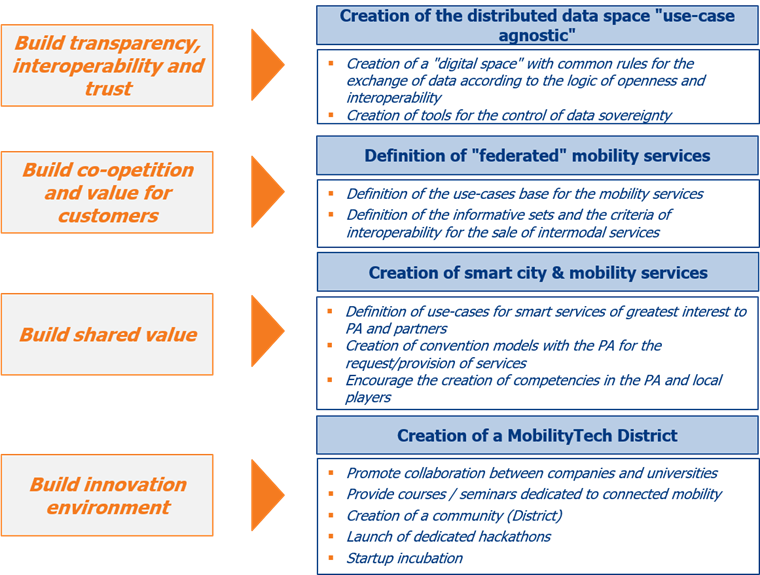
In the previous article – “The new mobility paradigm: the need to adopt and develop an ecosystem vision” – a high-profile view was given of the evolutionary model of mobility envisaged by OCTO and The European House – Ambrosetti. In particular, three different approaches were analyzed – Super App, closed interoperable ecosystem and open interoperable ecosystem – with which the connected model of mobility of the future could be concretely created.
In this article we chose to start from the final point of the previous one, namely the conceptualization of the possible ecosystem of mobility, understood in this case as an aggregation of different actors and sources of data needed to create and manage new forms of service. The work, carried out with more than 30 stakeholders who participated in the working tables organized by OCTO and The European House – Ambrosetti, confirmed that data sovereignty, interoperability and portability are the key elements for a vision of development that goes beyond, not only the current business boundaries, but also the current competitive logic. In concrete terms, with respect to the mobility ecosystem, we believe it is more plausible to create an open interoperable model in which the players, belonging to different components of the value chain, open up to collaborative logics through which they can benefit by combining their respective competitive advantages to generate new offers and new experiential models for customers.

As shared by most of the stakeholders involved, to realize this vision and stimulate convergence between operators it is necessary to launch individual pilot projects on very vertical limited perimeters in which there is a specific interest of the various operators involved from time to time and the possibility of achieving results in the short term. In a second moment, there will be the possibility of putting the different pilot projects into synergy, aiming at a broader ecosystem vision. To this end, in the second round of working tables, the teams of OCTO and The European House – Ambrosetti had the opportunity to present the vision and long-term objectives that the pilot projects should aim at. In this regard, it emerged that it will be essential to develop the Italian way to connected mobility through a series of small projects to validate the functioning, the role of the actors and to easily overcome any difficulties.
In line with OCTO’s vision, connected mobility will create value for consumers, society and businesses through new models of Mobility-as-a-Service (including the availability of mobility assets and the shopping and marketplace experience) and the enablement of Vision Zero (in its three components: Zero Crash, Zero Traffic and Zero Pollution).

The overall project “The Italian way to connected mobility” intends to encourage the experimentation of several pilot projects according to an ecosystemic approach, in which institutions and mobility actors will collaborate according to a logic of co-opetition and co-creation of services and experiences, all enabled by data. In this sense, data assume the value of a real productive factor within the value chain of the mobility ecosystem.
The success of the initiative promoted by OCTO and The European House – Ambrosetti is based on the need to build an innovative, transparent, interoperable, trust-generating ecosystem that works according to the logic of co-opetition aimed at creating shared value for all actors involved (and for consumers/users).

The first vision objective to be set is the possibility of building transparency, interoperability and trust among stakeholders (users included). In this sense, the working group of The European House – Ambrosetti will delve into the possible topics of focus of the pilot projects during the next Advisory Board scheduled for July 1, 2021. In particular, the potential and functioning of the so-called Mobility Data Spaces (MDS), i.e. the data spaces relating to the mobility ecosystem, which, in recent months, have aroused the interest and attention of various private players at European level and of the European Commission itself, will be understood. MDS are characterized by being open data spaces in which different actors have the possibility to draw in order to create new products and services within a safe and connected mobility ecosystem. Data sovereignty and high levels of privacy are some of the characteristics of MDS most appreciated at European level.
The second objective concerns the ability of players to evolve their business model towards open models in which co-opetitive logics, as observed in other sectors (e.g. in the financial sector), allow to create more value from openness. It will be then analyzed the Gaia-X project, a European project that aims to create a data infrastructure capable of stimulating the emergence of federated services at EU level. Also, in the case of Gaia-X it is possible to identify some use cases attributable to the world of mobility: specifically, the project aims to ensure ease and security in the transfer of data and the promotion of the ability of consumers to dispose of their data in an informed manner (so-called data sovereignty).
The achievement of the first two objectives lays the groundwork for the pursuit of the third objective, i.e. the creation of value for the community through the contribution that connected mobility can offer towards the smart city and, in particular, towards the promotion of a society without pollution, accidents and traffic. In this sense, it will be essential to ensure the engagement of public administrations within which new operational approaches and the adoption of new skills will be promoted. In this context, a fundamental role is also played by the regulatory framework, which will have to frame a clear framework through which public and private operators can collaborate. In this case, the analyses will aim to identify some key projects at EU level: these include the development of the mobility ecosystem underway in Hamburg and Frankfurt, projects that will be further referenced and developed to best suit Italian characteristics.
Finally, similarly to what is underway in other sectors, technological evolution, also followed by regulatory adaptation, allows for the entry of new players focused on highly innovative application verticals and able to exploit the potential enabled by data in an extremely agile manner. Similarly, to what happened in the financial and insurance fields, where Fintech and Insurtech ecosystems were created, in the mobility field we can hypothesize the birth of a Mobilitytech ecosystem. In order to attract in our country development initiatives that can also be an element of relaunch for the automotive supply chain, it is necessary to create the conditions for these initiatives to born and grow in scale. In this sense, the creation of districts and platforms where digital infrastructures and API connection models with companies are made available to startups represent clear elements of attractiveness. To this end, the example of what has already been done in the Fintech world by an Italian player will be analyzed. In this case we are dealing with an example belonging to another industry which, however, shows more and more points of similarity with what is happening/is expected to happen in the world of mobility.
From the working tables of June, it was possible to identify some enabling elements for the success of the Italian way to connected mobility: first of all, it will be necessary to work to develop new ways of collaboration between public and private. Although the involvement of the public actor is fundamental for the success of system initiatives, today the procedures do not make this relationship effective and efficient. Secondly, it will be necessary to define a set of common standards at the international level to be applied to the construction of connected mobility models. In this sense, it must be considered that means of transport do not operate only within a single country; it is therefore necessary that vehicles and other elements of the ecosystem operate according to the same set of standards, eliminating the risks deriving from a lack of connection or from a misunderstanding of the systems. In addition, the relationships between the actors must be developed according to a logic of co-opetition, ensuring the achievement of a win-win for all actors involved.
Ultimately, it can be said that with the working tables it was possible to collect the interest and willingness of various players in the Italian mobility ecosystem to participate in pilot projects for the development of a new paradigm of connected mobility. At the same time, the comparison with private and public players has given OCTO and The European House – Ambrosetti the opportunity to identify the obstacles and the elements enabling the success of a system initiative. Finally, it seems fair to say that, within the perimeter of this Advisory Board, some starting points for pilot projects are beginning to be outlined.
In the next and last article of this series, the use cases related to the four macro-blocks of development of the pilot projects, already mentioned above, will be presented in detail and some of the areas that the Advisory Board will decide to prioritize in the development of the Italian way to connected mobility will be described.
Authors:
Alessandro Viviani : Senior Consultant – Innotech Hub
Corrado Panzeri : Associate Partner – Head of InnoTech Hub
The European House – Ambrosetti